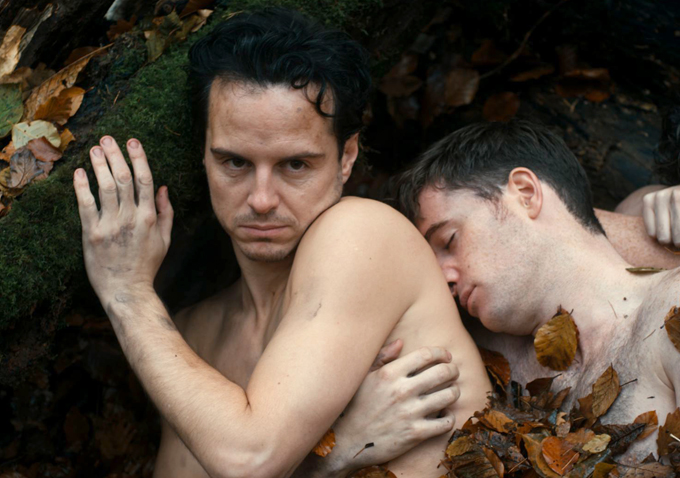
It makes sense that, given the overwhelming financial success of “The Hangover” franchise, other films would take that formula (of a bachelor party weekend spun wildly out of control) and try to put their unique stamp on the situation. So far we’ve already had “21 and Over” (“The Hangover” in college), “Last Vegas” (“The Hangover” with old dudes) and, of course, the cream of the crop, “Bridesmaids” (“The Hangover” from the bride’s side). What makes “The Bachelor Weekend” originally titled “The Stag” in Ireland) work, is that it is not content to merely replicate “The Hangover” formula with a slight alternation, but rather seeks to actively dismantle and the already established conventions, forging its own sweetly subversive path.
The differences between “The Hangover” and “The Bachelor Weekend” are noticeable from the get-go: the bride-to-be Ruth (Amy Huberman) visits the best man Davin (Andrew Scott aka Moriarty from BBC‘s “Sherlock“) and begs him to take her fiancé Fionnan (Hugh O’Conor) on a weekend outing before his obsessive fussing over the wedding leads to some kind of meltdown. Davin agrees, even though neither he nor Fionnan nor any of their buddies are exactly the type that would spend a weekend away with other dudes, engaging in outlandish behavior and the kind of male bonding that usually ends with someone in the hospital, having their stomach pumped.

Still, Davin agrees and sells Fionnan and the rest of the groom’s buddies on the idea. They’ll go out into the Irish countryside and camp and reconnect with the land and each other. But Ruth throws the lads a pretty severe curve ball: they must include her brother, an oafish lump of a man with the menacing nickname The Machine (Peter McDonald, the movie’s co-screenwriter), in the bachelor weekend plans. The other dudes are appalled, given The Machine’s reputation and their general foppishness (there’s a great montage where they’re picking out camping equipment and failing miserably), and try to avoid The Machine at every turn.
Unfortunately, The Machine catches up with them on the first leg of their journey, and inserts himself predictably into the scenario, causing chaos at nearly every turn. What’s nice about The Machine, both as a character and a plot device within the framework of “The Bachelor Party,” is that he is able to disrupt the action in ways that feel organic and create legitimate conflict, while also giving the characters the opportunity to open up about themselves and reveal details that otherwise wouldn’t have come out (at least in this kind of event-driven scenario). What makes The Machine also work so well as a character is that he isn’t just a towering douche bag—he’s a towering douche bag with layers, and the ways that the characters react to him often say profound things about who they are.
While on the bachelor party, out in the misty fields of Ireland (the Irish tourism board is probably not going to use clips from the movie in upcoming promotional campaigns), the men squabble and bark against a backdrop that is harsh and ancient. (The movie is full of mossy hues and autumnal colors.) The cosmology of the group is so different from movies like “The Hangover” that it’s almost beyond belief: not only is there a gay couple (The Kevins!), but there’s a character in dire financial straits (in a way that seems genuine and heartbreaking instead of merely superficial) and, of course, a collection of Irishmen who are at home literally anywhere else but the wilderness. Occasionally, the film veers too far into cartoonish territory, but the movie mostly keeps a keenly level approach to the comedy, with equal parts humanistic character stuff and wacky slapstick comedy.

Part of the reason the comedy works so well is that director John Butler plays everything pretty much with a straight face. Things may get oversized, particularly towards the end of the movie where you see more bare man-ass than in “Magic Mike,” but for the most part Butler seems to encourage the actors to treat everything, more or less, seriously. There’s a looseness to the performances that Butler also encourages, one that thankfully never tips, precariously, into the land of the endless improvisation. This is a tighter, more controlled exercise than most modern comedies, which seem to flounder in excessive, Apatow-ian indulgence. O’Conor and McDonald commit to the roles beautifully, as two opposite sides of the same coin, since they’re both men who absolutely love Ruth, but for different reasons (and with two entirely separate approaches). But the real breakout of “The Bachelor Party” is Scott, who plays such a devilish villain on “Sherlock” but here illuminates a softer side that is equal parts hilarious and sometimes quite sad (his character has a great reveal later in the movie).
While “The Bachelor Weekend” might not please fans of “The Hangover” and its ilk because it doesn’t trade in the kind of gross-out humor that forms the bedrock for those movies (although there is a pretty good masturbation gag; it’s short and heavy on implied naughtiness and very low on the real stuff), the comedy is going for something different, something more relatable and more emotional than those movies. It’s refreshing to see the filmmakers take this approach, and its sweetness might be the most subversive thing about it. For all the hemming and hawing and male bonding, “The Bachelor Weekend” is, first and foremost, utterly adorable. [B+]
Browse through all our coverage of the 2014 Tribeca Film Festival by clicking here.

